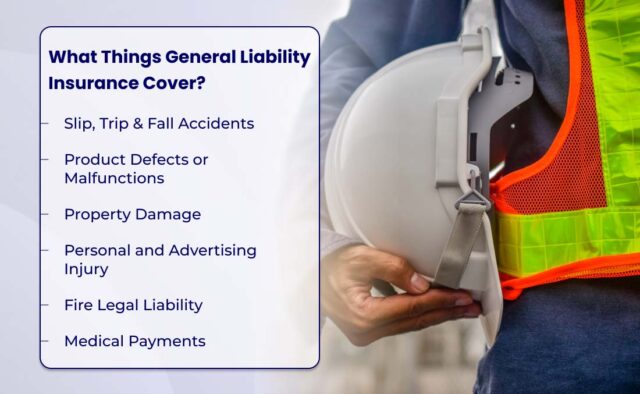Business insurance is also defined in simple terms as an all-inclusive instrument for the undertaking of a form of the organization to provide comprehensive protection against unexpected costs. Everything is advancing rapidly, and changing strategies in this business scene cannot be emphasized more than assuring your business, in this case, is a business requirement. This write-up describes what business insurance entails, explains in depth its significance, and addresses some of the frequently raised queries so that you are not caught off guard while running your company.
What is included in the first instance within the Framework of Business Insurance?
Business insurance primarily covers a number of distinct types of coverage which are customized to satisfy and address the various types of organizations. Let’s look comprehensively into these aspects in detail regarding on the basis of major points. These are the basics by and large:
1. General Liability Insurance: This is not a common saying; rather, this is the prevalent business among businesses that is more than needed. An insurance coverage that losses covering blanket terms, over any three legal claims of injuries. CGL stands for “Commercial General Liability” which stands for protection from claims made against privity damage that occurred due to other individuals especially clients. For instance, if a customer steps in careless manner on your building.
2. Property Insurance
3. Business Interruption Insurance: Business interruption insurance mitigates lost income and residual costs whenever there are some insurable perils which prevent the entity from conducting oy. This kind of coverage is quite important particularly to the businesses that areas prone to risks such as flood or fire.
4. Employers Liability Coverage: Employees are supposed to be made to understand that their protection is obligatory under the law as well as ecologically. Medical and wage loss for employees injured in the course of work is provided for under workers compensation insurance. In addition, this insurance also gives coverage for the business from legal suits that may be directed towards it.
5. Errors and Omissions Insurance: This definitely falls under service businesses; this is also known as errors and omissions insurance. It provides a safeguard for claims made against businesses from lack of due care or other unreasonable mistakes or lack of action which causes the clients of the businesses’ financial loss.
What is Breakdown Coverage?
Breakdown coverage in certain case can be described as a type of insurance which protects the business against breakdowns of the equipment commercially. Be it a defective HVAC system or a broken-down production line machinery etc., the policy takes care of such expenses. For example:
This is what breakdown coverage is meant to provide; its goal is to help maintain the integrity of your business despite any kind of technical breakdown.
| Scenario | Potential Loss | Breakdown Coverage Benefits |
|---|---|---|
| Manufacturing equipment failure | Production delays and lost revenue | Covers repair costs and revenue replacement |
| Office server crash | Data loss and IT recovery costs | Covers IT services and downtime compensation |
The Business of Insurance: Safeguarding Your Enterprise=
In the current world, protecting your business is no longer just an option, it is something that must be done. Risk Management and
Insurance: Core Principles of the Industry
Sometimes, when clients come to the insurance agency, they tend to regard it as a commercial venture only and this is a common mistake. An insurance company in its simplest terms is a business that aims to turn a profit while offering protection to its clients. The approach brings assurance to policyholders.
When it comes to corporations, appropriate insurance policies ensure:
Business Continuity: Eliminating unanticipated accidents and losses.
Legal Compliance: Insurances required by states or industries are obtained.
Employee Coverage: Cover such payments by offering security like health insurance to attract and retain talent.
What Exactly Does the … CGL Classification Mean on Insurance Policies?
A policy that all businesses require is the CGL or Commercial General Liability. Essentially CGL insurance provides coverage for:
- Bodily injury sustained by someone who is a visitor to your business premises or place of work.
- Property damage as a result of the firm’s activities.
- Personal or advertising injuries, such as slander and infringement of copyright.
Commercial General Liability policies are important in protecting your firm against general liabilities which are related to the operation of the business and more often than not tend sue the firm.
Other kinds of business insurance
To get full protection, businesses may need the following insurances:
1. Cyber Liability Insurance: The threat from Cyber-attacks is increasing with the advancement of technology. Cyber-liability covers data losses due to breaches and ransomware attacks and the IT recovery costs protecting the image and the finances of a business.
2. Product Liability Insurance: Product liability insurance for manufacturing and retail businesses ensures that they are compensated for any injury or harm that may arise from any of the products sold or manufactured.
3. Umbrella Insurance: This policy adds on top of the payouts of already existing policies ensuring that any major claims will not leave you financially drained.
Benefits of Business Insurance
Many benefits come with an investment in business insurance:
Cover Against Loss: Loss incurred from damages to property, as well as liability claims, will be covered by the insurance and thus avoid heavy costs.
Improved Credibility: Insured businesses are more credible and are more trusted by clients and partners.
Business Stability: Policies like business interruption insurance will cover your business until it is stable enough to start operations after a disaster.
Practical Illustrations of Operational Business Insurance
So, why are some businesses so determined to purchase operational business insurance? Let’s look at some real-life examples.
Example 1: Property Damage
In a fire incident, a kitchen belonging to a bakery was gutted causing a lot of damage to the establishment. Insurance policies that covered property damage enabled the bakery to reconstruct and replace equipment, thus allowing the bakery to resume operations in a few months.
Example 2: Cyberattack
There was a ransomware episode in a law firm and the clients’ information was at risk. Cyber liability insurance took care of the ransom payment, and the IT recovery processes, hence the firm managed to avert a disaster.
Example 3: Employee Injury
A worker working in a construction company got injured while working. In this case, the compensation insurance paid for medical and rehabilitative expenses enabling the firm to avoid legal action.
Common Misconceptions About Business Insurance
Some business owners have been led to believe that their businesses do not need any insurance coverage which is fundamentally incorrect:
“Small businesses don’t need insurance.”
However, there are risks that small enterprises can be exposed to that can lead to momentous loss.
“All insurance policies are the same.”
Each policy is configured to attach liability to various risks so that fitting insurance can be chosen that will be appropriate for an organization.
“I only need insurance for mandatory coverage.”
Finding the Right Business Insurance
How to get the correct insurance policy entails:
Risk Assessment: Evaluate the weaknesses that your business processes may have.
Policy Comparison: Look at more than one carrier’s coverage and premium rates.
Seeking Professional Help: Approach insurance agents so as to be adequately insured…insurance is a very broad take that shields an enterprise against any unforeseen adverse financial trends. The details of what business insurance entails are covered in this paper together with its significance and also some frequently asked questions and how these should be understood in order for your business to be strong and ready.
What is Covered by Business Insurance?
Business insurance consists of many different forms of coverage designed especially for business entities. Here’s a descriptive explanation of the basic coverage parts:
1. General liability insurance: It can also be referred to as CGL insurance which is a must for all businesses. General Liability Insurance (CGL) is a type of insurance that protects against third-party claims of bodily injury, property damage and personal injury. For example, if a customer falls on your company’s premises, CGL would cover you against any expenses.
2. Property insurance: Most businesses are financially active and have large investments in fixed assets such as buildings and managed equipment. Property insurances are policies that pay off damages caused by fire, burglaries, natural calamities, among many others. This ensures that your operations are able to continue in an orderly manner after the first few hours, which would minimize disruptions.
3. Business Interruption Insurance: In case of particular situations whereby one cannot continue with business operations, business interruption insurance or coverage ensures that one doesn’t face any loss or expends amount. This insurance policy is most effective for businesses which deal with high-risk activities like floods or fires.
4. Workers’ ‘Compensation Insurance: It is also an ethical obligation to protect your employees. For instance, workers’ compensation insurance works in the way that, medical expenses or lost wages for employees injured while working, will be paid. It also saves the business from lawsuits.
5. Professional Liability Insurance: Primarily known as Errors and Omissions (E&O) insurance, this coverage is especially pertinent in the service industry. Liability policies insure the policyholder against claims for negligence, errors or omissions that result in a loss for the clients of the policyholder.

What is Break Down Coverage?
Break Down coverage like any other kind of insurance, protects businesses from the risk of equipment breakdown. Whenever there is a failure or break down of a system, like an air conditioning system or machinery in the production line, costs of repairs or replacement are covered by the policy. For example:
In summary, breakdown coverage guarantees that your business will operate the way it is expected, regardless of the occurrence of a technical breakdown.
Key Considerations for Business Insurance
| Factor | Why It Matters | Example |
|---|---|---|
| Industry-specific risks | Tailored coverage for unique risks | IT firms need cyber liability insurance. |
| Size of the business | Determines coverage limits | larger businesses require higher limits. |
| Budget | Balancing cost and coverage | Affordable premiums without sacrificing protection. |
FAQs: Business Insurance
Q1: Why do you consider business insurance necessary?
Insurance coverage against loss, a legal suit or interruption of business is needed for sustainability of the business over the years.
Q2: How much are the losses from business interruption?
The business interruption insurance indemnifies revenue loss, rental income and wages and salaries when operations have come to a stop due to specified events.
Q3: What is breakdown coverage?
Breakdown coverage enables a business to be compensated for the costs incurred in making repairs or replacing breakdown in major machinery thus reducing the period of idleness.
Q4: What does CGL stand for in the insurance profession?
CGL is the abbreviation of Commercial General Liability which is an insurance policy that protects against claims for bodily injury and damage to property as well as some personal injuries.
Conclusion
Business insurance is not only insurance but rather a forward looking inclined strategic move for the business. The insurance range from general liability to cyber coverage prevents the business from incurring losses and facing legal issues. It is possible to be able to make financial losses and using your insurance coverage deliberately enables you to fit in any business environment and thrive.
Make the correct decisions today and secure your business for the future.







